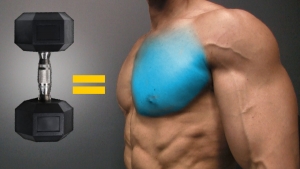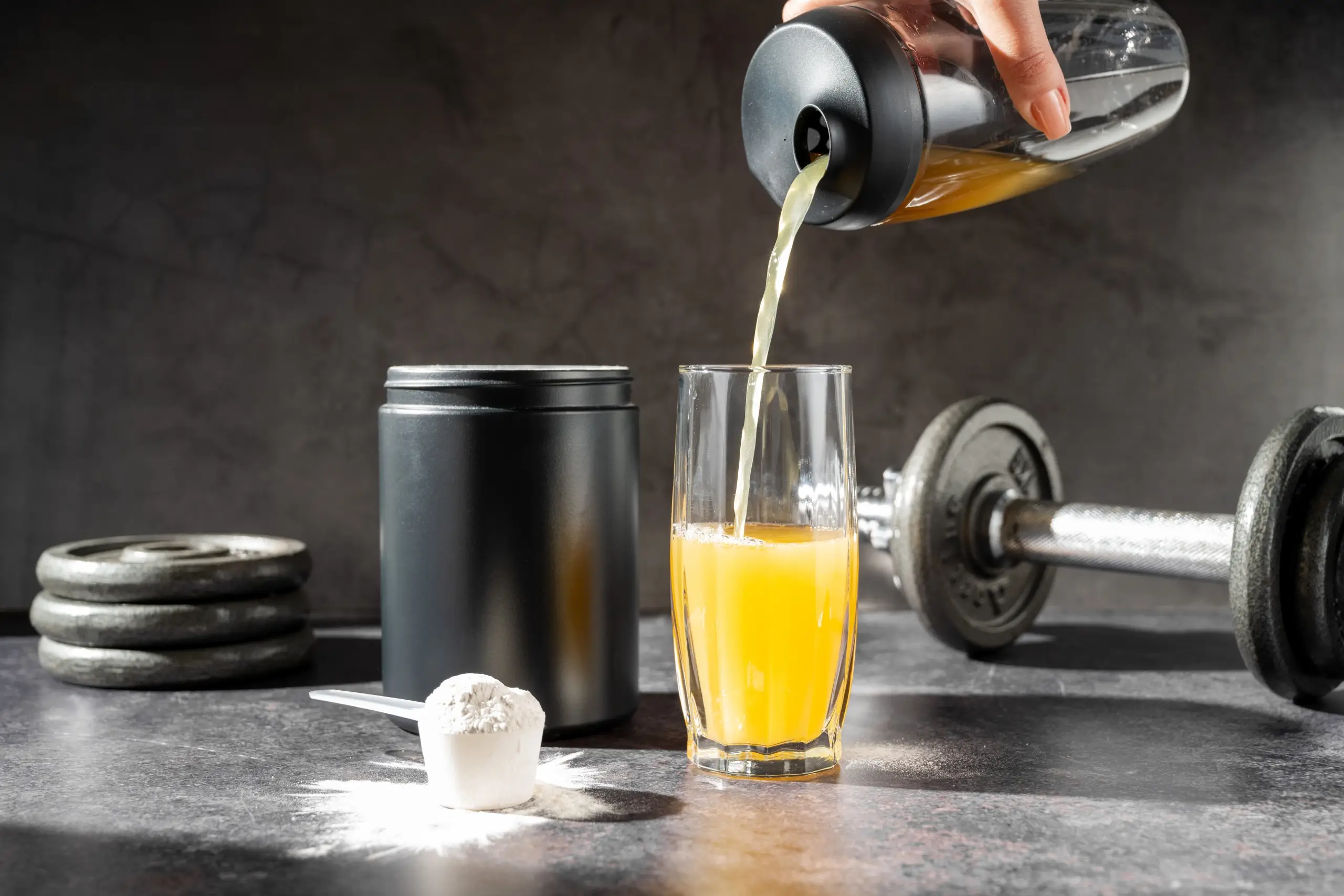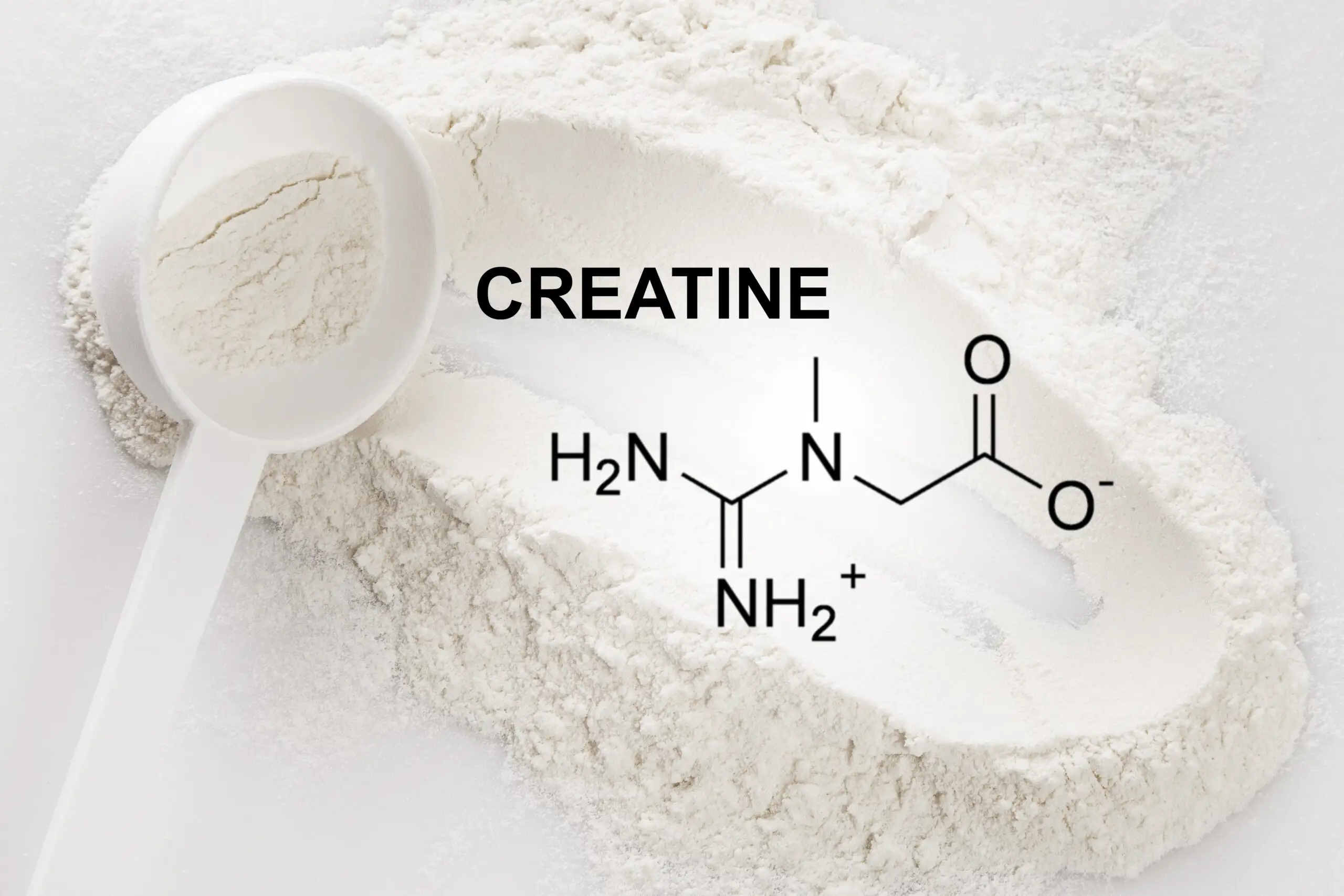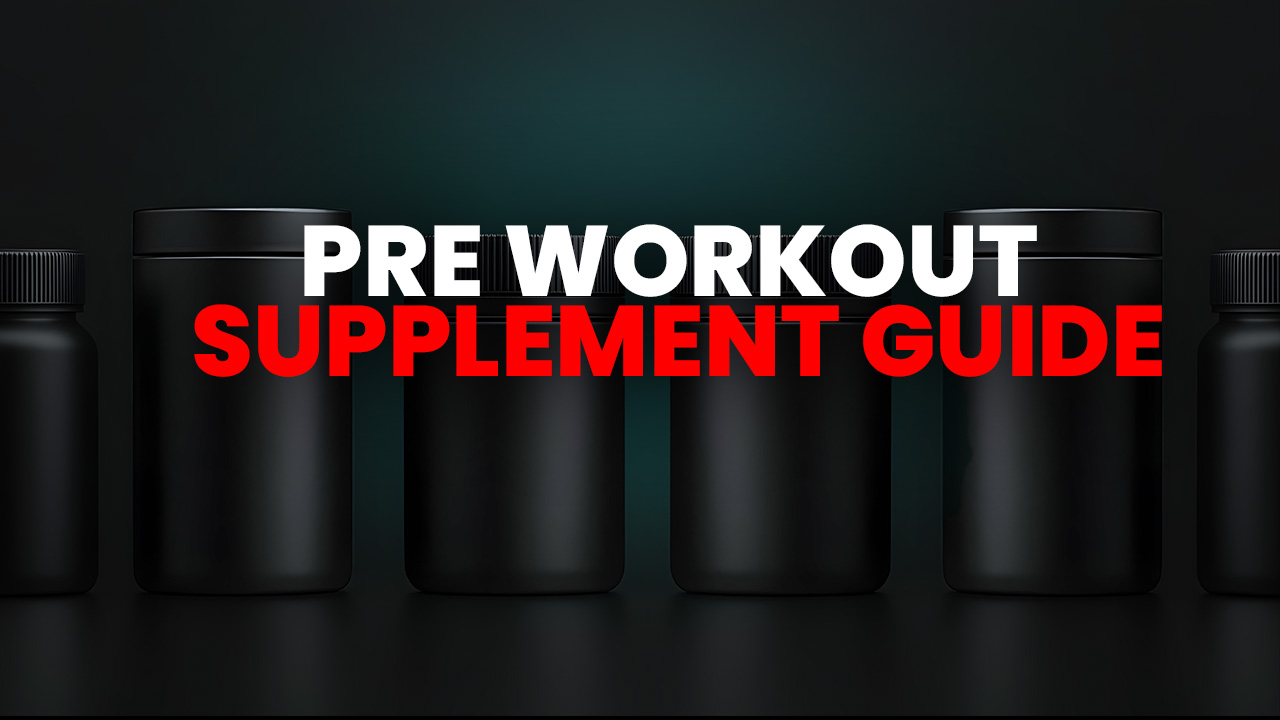
IS YOUR PRE-WORKOUT WORKING?
That jolt of energy might feel like it’s doing something, but if all you’re getting is the shakes and a racing heart, you’re missing the point.
A real pre-workout doesn’t just jack up your nervous system. It primes your body to perform.
We’re talking more power, better focus, increased blood flow, and delayed fatigue. This is the kind of stuff that translates to actual progress in the gym, not just hype on a label.
In this guide, I’m breaking down some of my favorite proven ingredients along with the doses that deliver in a gold standard pre-workout supplement.
No fluff. No under-dosed “proprietary blends.” Just what works, why it works, and how to make it work for you.
WHAT DO PRE-WORKOUTS DO?
A pre-workout supplement isn’t just about a boost of energy. And it’s definitely not about how much caffeine content you can cram into one scoop.
If that’s all you’re looking for, save your money, and drink a few cups of coffee.
But if you want to increase physical performance, dominate high-intensity exercise, and push through muscle fatigue without crashing halfway through your session, this is where the right pre-workout supplement can help you.
Here’s what a pre-workout (paired with a balanced diet) is supposed to do:
ENHANCE MENTAL FOCUS
Your muscles don’t move without your brain.
That’s why elite-level training starts with sharp mental focus, especially during high-intensity exercise when distractions, fatigue, and stress start to creep in.
Ingredients like L-tyrosine and caffeine (in proper amounts) help boost concentration during exercise sessions, dial in your mind-muscle connection, and keep you locked in from warm-up to final rep.
BOOST MUSCULAR ENDURANCE
Ever hit that wall mid-set? That’s not a lack of strength; it’s a lack of endurance.
Proper pre-workouts use ingredients like beta-alanine to increase carnosine levels, buffer acid buildup, and let you grind out more power reps before fatigue sets in.
The result? More volume. More overload. More muscle growth.
IMPROVE STRENGTH AND POWER
Power output isn’t just for Olympic lifters.
Ingredients like betaine anhydrous and creatine help increase force production, improve neuromuscular efficiency, and move heavier weight.
That’s not stim-based hype. It’s real performance enhancement.
INCREASE NITRIC OXIDE AND BLOOD FLOW
Want a better pump? You need blood flow and that means increasing nitric oxide levels.
Ingredients like L-citrulline malate and arginine nitrate open up your blood vessels, flood your muscles with oxygen and nutrients, and support everything from exercise metabolism to recovery.
Plus, let’s be honest. The pump and blood flow in muscles just feels good.
REDUCE FATIGUE
No one wants to fizzle out in the middle of a workout.
The right combo of energizing ingredients supports consistent energy levels, buffers muscle fatigue, and prevents that mid-set meltdown.
Proper doses of amino acids, moderate caffeine content, and hydration support from things like taurine keep your tank full without the muscles’ energy crash or adverse side effects.
This is why pre-workouts are popular with everyone from the weekend warrior to the competitive athlete.
When backed by proper dosing, they support muscle mass, better body composition, and increased aerobic capacity, all while minimizing muscle fatigue and helping with faster recovery.
PRE-WORKOUT SUPPLEMENTS VS. ENERGY DRINKS
A lot of people make this mistake. Energy drinks? Mostly caffeine, sugar, and artificial flavors.
Sure, they might spike your energy levels, but they don’t support exercise metabolism, blood vessels dilation, or sustained exercise performance.
True pre-workout formulas are designed with intent.
They include active ingredients like beta-alanine, L-citrulline malate, taurine, L-tyrosine, creatine, and branched-chain amino acids.
These ingredients are chosen because of their evidence for effectiveness in improving athletic performance, not because they sound cool on a label.
BEST PRE-WORKOUT INGREDIENTS TO USE
We don’t pick pre-workout ingredients because they “sound cool” or because they showed up in some influencer’s scoop of the week.
We pick them because they work in the lab, and more importantly, in the gym.
If it doesn’t show up in clinical research or translate to real-world performance, it doesn’t make this list.
So, what you’re about to see are the best pre-workout ingredients.
The ones backed by scientific studies, supported by effective dosing, and proven to enhance exercise performance, not just spike your caffeine levels.
Here’s how we chose them:
CLINICAL RESEARCH COMES FIRST
Every ingredient here is backed by peer-reviewed studies published in respected academic institutions or scientific journals.
We looked for evidence for efficacy in actual humans, not just mice running on tiny treadmills.
That means double-blind, placebo-controlled human trials where results weren’t just measurable, they were meaningful.
PROVEN RESULTS IN ATHLETES, NOT JUST BEGINNERS
It’s easy to show results when someone’s brand new to the gym.
We focused on ingredients tested in trained individuals, the people already lifting, sprinting, and grinding out reps.
Why? Because that’s where you see if a supplement has real-world carryover.
If it improves anaerobic performance, endurance, or lean body mass in trained athletes, it works.
SAFE, EFFECTIVE, AND CLINICALLY DOSED
Every ingredient here passed our three-part test:
- Scientifically validated for efficiency during exercise
- Delivered in adequate amounts based on actual human trials
- Low risk of adverse effects, even in those with common health conditions (think blood pressure, blood sugar, etc.)
We took into account possible adverse side effects (e.g., allergic reaction), caffeine content, and ingredient interaction risks, like with blood thinners or prescription medicine.
These aren’t guesswork doses. They’re based on what works and what’s safe.
NO HYPE INGREDIENTS, NO FILLERS
If it didn’t earn its spot, it didn’t make the list.
That means no under-dosed arginine alpha-ketoglutarate, no bitter orange extract, and no complex oligosaccharides maltodextrin acting like it’s a performance enhancer.
We skipped the stuff that’s been shown to have limited evidence or zero anabolic effects, and went straight to the ingredients that aid sports performance, fuel for muscle growth, and help your body recover faster.
CON-CRET® CREATINE HCL
CON-CRET® Creatine HCL is a patented, highly concentrated form of creatine hydrochloride. It’s a newer, more water-soluble version of traditional creatine monohydrate.
It was developed to deliver the same (or better) research-backed performance benefits without the bloating, water retention, or stomach issues that some people get from the older forms.
It’s ideal for lifters, athletes, and anyone who wants to increase strength, boost muscle performance, and recover faster.
HOW IT WORKS
Like all creatine supplements, CON-CRET® helps replenish ATP, your body’s primary source of explosive energy.
During high-intensity training like sprinting, lifting heavy, or grinding out low-rep sets, your muscles burn through ATP fast.
Creatine HCL helps regenerate it faster, so you can lift more, push harder, and perform longer.
What sets Creatine HCL apart is its superior solubility and absorption.
That means no loading phase, no stomach discomfort, and no guesswork. Just mix and go.
WHAT IT’S BEEN PROVEN TO DO
CON-CRET® Creatine HCL has been shown to deliver all the strength performance benefits of standard creatine without the common drawbacks.
First, it helps increase maximal strength and power output, making it especially effective during heavy resistance training.
It also works to enhance muscular endurance workouts, allowing you to get more reps before fatigue forces you to rack the weight.
Over time, consistent use of Creatine HCL has been linked to improved lean muscle mass and body composition, helping you build strength without adding unnecessary bulk or water weight.
It also helps speed up recovery by reducing muscle breakdown and post-workout soreness, so you’re ready to hit the gym hard again faster.
Perhaps one of its most appreciated benefits is that it delivers results without bloating, water retention, or gastrointestinal distress, making it an ideal option for athletes who couldn’t tolerate traditional monohydrate. [1]
RECOMMENDED DOSE
Because it’s more concentrated and better absorbed, you don’t need as much as the five grams of creatine monohydrate.
Two grams of Creatine HCL (like the dose found in CON-CRET®) is plenty to saturate your muscles over time.
And as I mentioned above, there’s no loading phase that’s required, and no need to cycle off.
Just take it consistently, preferably post-workout or with your pre-workout, and let the results compound.
And yes, it stacks perfectly with every other ingredient on this list.
CARNOSYN® BETA-ALANINE
Beta-alanine is a nonessential amino acid, meaning your body can produce it, but not in the amounts you need to crush an intense workout.
CarnoSyn® is the premium patented form, clinically studied, tested, and trusted by athletes at every level.
But beta-alanine doesn’t work alone. Once inside your body, it binds with histidine to form carnosine, and that’s where the magic happens.
HOW IT WORKS
When you’re training hard, you build up hydrogen ions in your muscles. That’s what causes the burn. It’s also what kills your performance.
Carnosine buffers those hydrogen ions, keeping your pH levels stable so your muscles don’t tap out early.
That means you fight fatigue and push harder, longer.
WHAT IT’S BEEN PROVEN TO DO
First, beta-alanine has been shown to significantly increase muscular endurance during high-intensity training.
It doesn’t matter if you’re grinding through a heavy set of squats or powering through sprint intervals, it helps your muscles resist fatigue so you can keep pushing when others start to fade.
It also improves overall work capacity, meaning you can complete more sets, more reps, and more total training volume before hitting the wall.
This extra output adds up over time, and more volume equals more progress.
One of beta-alanine’s biggest strengths is its ability to delay neuromuscular fatigue, especially during demanding compound lifts like deadlifts, rows, and presses.
By buffering acid buildup in your muscles, it keeps your nervous system firing efficiently so your form doesn’t break down in the middle of a tough session.
Finally, beta-alanine shines in the performance sweet spot: efforts lasting one to four minutes.
That’s your high-rep sets, your conditioning circuits, your hypertrophy work, exactly the kind of training where fatigue hits hard and beta-alanine fights back. [2]
RECOMMENDED DOSE
This is where most pre-workouts get it wrong.
The clinically effective dose is 3.2 grams per day. Some studies even go higher, but 3.2 grams is the proven gold standard.
You’ll know it’s working when you feel a light tingling sensation (paresthesia).
That’s not a side effect; it’s a sign the ingredient is dosed right.
L-CITRULLINE MALATE
L-citrulline malate is a combination of two powerful compounds: L-citrulline, an amino acid that boosts nitric oxide production, and malic acid, a compound that plays a key role in energy metabolism.
Together, they form a synergy that makes this one of the most effective pre-workout ingredients on the planet.
Citrulline gets converted into arginine in the body, but unlike taking straight arginine (which has poor absorption), L-citrulline malate delivers consistent results with far better bioavailability.
More arginine means more nitric oxide and that translates to better blood flow to your working muscles.
HOW IT WORKS
Increased nitric oxide widens your blood vessels, improves circulation, and allows more oxygen and nutrients to reach your muscles during training.
Malic acid supports ATP production by helping your body convert food into usable energy more efficiently.
This one-two punch means your muscles aren’t just pumped; they’re powered up.
WHAT IT’S BEEN PROVEN TO DO
L-citrulline malate is backed by solid research showing measurable improvements in both workout performance and post-training recovery.
One of its primary benefits is its ability to increase nitric oxide production, which helps dilate blood vessels and improve circulation.
This enhanced blood flow leads to stronger muscle pumps, greater vascularity, and more efficient nutrient delivery to working muscles during training.
It also plays a key role in boosting muscular endurance, particularly during high-rep or volume-heavy workouts.
That means you’re able to push further into each set without burning out, ultimately increasing total training volume, a critical factor for muscle growth.
Another standout benefit is its ability to reduce muscle soreness after training.
Studies show that L-citrulline malate can lower post-exercise soreness by improving oxygen delivery and removing waste products like ammonia and lactate from the muscles, which speeds up recovery between sessions.
Finally, this ingredient has been shown to enhance performance in resistance-based training by increasing the number of reps performed per set and delaying the point of muscular failure.
The result? More quality work in every session, without as much fatigue. [3]
RECOMMENDED DOSE
Most studies showing benefits use 6 to 8 grams of L-citrulline malate, with 6 grams being the widely accepted minimum effective dose.
Unfortunately, many commercial pre-workout products underdose this ingredient or hide the amount in a proprietary blend, which means you’re not getting enough to matter.
L-TYROSINE
L-Tyrosine is one of the non-essential amino acids that plays a big role in producing key neurotransmitters, namely dopamine, norepinephrine, and epinephrine.
These are your brain’s “focus and fight” chemicals, the ones that drive mental sharpness, motivation, and resilience under stress.
During intense workouts, especially under fatigue, stress, or sleep deprivation, your body burns through these neurotransmitters fast. That’s where L-Tyrosine comes in.
HOW IT WORKS
L-tyrosine helps replenish the precursors your brain uses to stay alert and responsive.
When physical stress is high and mental fatigue sets in, this ingredient supports cognitive function, so your brain keeps up with your body.
It’s not about overstimulation like a boost from caffeine.
It’s about mental clarity, focus, and staying locked in when it matters most, especially during long sessions, complex lifts, or demanding training days.
WHAT IT’S BEEN PROVEN TO DO
L-tyrosine has been shown to improve cognitive performance under stress, helping you maintain mental sharpness, reaction time, and decision-making even when your body is physically taxed.
One of its primary benefits is its ability to support mental focus and alertness, especially in high-stress situations or when you’re sleep-deprived, two conditions that can derail even the most well-planned workout.
It also enhances working memory, which means you can stay mentally dialed in during your workout, remember your cues, and maintain proper form.
In addition, L-Tyrosine may help reduce mental fatigue, making it particularly valuable during longer training sessions or fasted workouts where your energy reserves are lower and brain fog can creep in.
One of its most underrated benefits is how well it works in combination with caffeine.
Instead of compounding the jittery effects like some stimulants, L-tyrosine helps balance them out, amplifying focus without the crash or anxious edge.
This makes it especially useful for athletes who train under pressure, early in the morning, or during high-stakes performance sessions. [4]
RECOMMENDED DOSE
Most of the studies showing benefits used 1 to 2 grams of L-tyrosine. 1.5 grams hits the sweet spot, high enough for effectiveness, low enough to avoid GI issues.
Just watch for one thing: N-Acetyl L-Tyrosine (NALT) is often marketed as a better version, but research shows it has lower bioavailability than plain L-tyrosine.
Don’t fall for that label trick. Stick to the real deal and the right dose.
TAURINE
Taurine is a sulfur-containing amino acid found in large concentrations in the brain, heart, and skeletal muscles.
While it’s technically a nonessential amino acid, meaning your body can produce it on its own, intense training and stress can deplete levels faster than your body can keep up.
Unlike stimulants or nitric oxide boosters, taurine works more subtly but don’t let that fool you. It plays an important role in hydration, muscle function, electrolyte balance, and cellular protection.
HOW IT WORKS
Taurine acts like a cellular bodyguard.
It helps regulate fluid balance in your cells, making sure your muscles stay hydrated and primed for contraction.
It also supports calcium signaling within muscle cells, which is critical for explosive strength and sustained contractions.
On top of that, taurine acts as an antioxidant, fighting off exercise-induced oxidative stress, and protecting your muscles from breakdown and fatigue.
WHAT IT’S BEEN PROVEN TO DO
Taurine has been shown to deliver a wide range of performance and recovery benefits, particularly when combined with other clinically proven pre-workout ingredients.
One of its key strengths is its ability to improve muscular endurance, allowing you to sustain effort over longer periods without fatiguing as quickly.
This is especially helpful during high-volume or extended training sessions where burnout can creep in fast.
It also helps reduce muscle damage and soreness, which means faster recovery after workouts and less downtime between hard training days.
By limiting oxidative stress and cellular damage, taurine keeps your body ready for what’s next.
Another major benefit is its role in hydration and electrolyte balance.
Taurine helps regulate fluid within muscle cells and supports the movement of key minerals like sodium and potassium, crucial for both performance and preventing cramps during intense workouts or in hot environments.
Taurine doesn’t just help the body, it helps the brain, too.
It has been shown to enhance cognitive function and mood, especially under physically stressful conditions, making it easier to stay mentally sharp and motivated when fatigue sets in.
Finally, taurine works synergistically with caffeine by smoothing out its stimulant effects.
This combination helps reduce jitters, anxiety, and post-workout crashes that can come with high levels of caffeine in pre-workouts. [5]
RECOMMENDED DOSE
The research-backed dose ranges from 1 to 2 grams daily, with 1 gram being the ideal sweet spot for most pre-workout applications.
It’s enough to deliver results without overloading your stack, especially when paired with multi-ingredient pre-workout supplements.
Unfortunately, taurine often gets shortchanged or completely overlooked in commercial sports nutrition supplements because it’s not a stimulant, doesn’t “sell,” and doesn’t produce a flashy effect.
But in terms of actual performance impact, it’s more than earned its spot.
BETAINE ANHYDROUS
Betaine anhydrous is a naturally occurring compound found in foods like beets, spinach, and whole grains.
In the supplement world, it’s known for its role in methylation, hydration, and cellular power output.
Think of it as a behind-the-scenes performance booster: It doesn’t give you a buzz or a pump, but it helps your muscles contract harder, recover faster, and grow stronger over time.
That’s why it’s gaining traction in serious pre-workout formulas and bodybuilding type of supplement products.
HOW IT WORKS
Betaine primarily supports cellular hydration and methyl donation, which affects everything from protein synthesis to hormone regulation.
In the gym, that translates to improved power output, better endurance, and increased muscle protein synthesis.
It also helps reduce homocysteine levels, a compound linked to cardiovascular stress, which may improve overall heart health during intense training blocks.
And by supporting hydration inside the muscle cell, it gives you more volume and strength where it counts.
WHAT IT’S BEEN PROVEN TO DO
Betaine has earned its spot on the short list of evidence-backed ingredients for building strength and improving body composition.
One of its most notable benefits is its ability to increase muscular strength and power, especially in compound lifts like squats, deadlifts, and the bench press. That means more weight on the bar and more force behind each rep.
It also helps enhance muscle endurance, allowing you to squeeze out more reps before fatigue sets in.
Beyond performance, betaine has been shown to promote lean muscle mass gains, particularly when paired with a consistent resistance training program.
Another key benefit is its ability to improve body composition by supporting fat loss while simultaneously building muscle, a rare and highly sought-after combo for athletes and lifters.
On a cellular level, betaine may also aid in muscle protein synthesis, which plays a major role in recovery, repair, and long-term adaptation to training. [6]
RECOMMENDED DOSE
Clinical studies consistently use 2.5 grams per day, typically split into two 1.25g servings.
That’s why 1,250 mg is a solid starting dose for a pre-workout supplement, especially if you’re getting another serving later in the day through food or another stack.
CAFFEINE ANHYDROUS
Caffeine anhydrous is a highly concentrated, dehydrated form of caffeine commonly used in powder form in many bestselling pre-workout supplements.
Unlike the caffeine in your morning coffee or green tea extract, caffeine anhydrous delivers a fast, powerful hit—no fluff, no filter.
It works by acting as an adenosine receptor antagonist, blocking the neurotransmitter that makes you feel tired. The result? Increased alertness in athletes, elevated energy during workouts, and better focus when the intensity kicks in.
You’ll find it in nearly every class of bodybuilding supplement, especially multi-ingredient dietary formulas targeting strength, endurance, and body fat loss.
Because of its powerful effects, caffeine is even listed in the official guidance from the United States Anti-Doping Agency (USADA).
It’s allowed in competition but monitored closely due to its strong ergogenic properties and performance-enhancing potential.
HOW IT WORKS
When caffeine blocks adenosine, your brain ramps up activity. You feel more awake, more alert, and more motivated to train. But that’s just the surface.
Caffeine also stimulates the release of epinephrine (adrenaline), increases fat oxidation, and improves calcium release in muscle fibers, which translates to stronger energy to contract and improved muscle recruitment.
It’s also been shown to enhance exercise metabolism, making it a legit fat-loss agent when paired with proper training and nutrition.
WHAT IT’S BEEN PROVEN TO DO
Caffeine is one of the most extensively researched and effective dietary supplements in sports nutrition, with a long track record of enhancing physical and mental performance.
One of its key benefits is its ability to increase strength and anaerobic power output, particularly during compound lifts like squats, deadlifts, and Olympic movements.
This makes it a go-to for athletes who rely on explosive strength and fast-twitch muscle activation.
It also plays a significant role in improving muscular endurance, especially during longer training sessions or high-volume resistance workouts where fatigue usually sets in.
By delaying exhaustion, caffeine allows you to maintain performance deeper into your session.
Another proven benefit is its impact on focus and reaction time.
For athletes in competition or anyone performing high skill lifts that demand precision, caffeine helps sharpen mental clarity and reduce response time, keeping you mentally locked in when every second counts.
Caffeine has also been shown to elevate mood and boost motivation, which can be crucial during tough training blocks or early-morning sessions.
It helps combat both physical and mental fatigue, giving you the mental edge to show up and push through.
Finally, caffeine supports fat loss by increasing thermogenesis and helping your body use fat as fuel for exercise.
This makes it an effective ingredient for improving body composition when combined with proper training and nutrition. [7]
RECOMMENDED DOSE
The effective dose of caffeine typically ranges from 3–6 mg per kilogram of bodyweight. For most people, that’s somewhere between 150–300 mg, or about 1–3 cups of coffee.
At 200 mg, you’re getting a solid, research-backed dose without pushing into the territory of dangerous side effects like cardiac arrhythmia (irregular heartbeat), shortness of breath, or overstimulation.
Unfortunately, some common pre-workout products push concentration of caffeine well past 300 mg and stack it with other stims, leading to an elevated risk of potential side effects, especially for people with cardiovascular health conditions like high blood pressure or anxiety.
And don’t forget: too much caffeine can mess with aid recovery, sleep quality, and even contribute to a rebound energy crash negating the very performance boost you’re after.
PRE-WORKOUT TIMING AND STACKING
A great pre-workout doesn’t just depend on the right ingredients. It depends on when and how you use it.
The best pre-workout blends in the world won’t do much if you mistime your scoop, mix it with a heavy meal, or overload on amounts of caffeine without a plan.
Here’s how to use your pre-workout supplement like someone who’s serious about training, not just chasing a buzz.
WHEN TO TAKE IT
You want to hit the sweet spot, not too early, not too late. The ideal window is 30 to 45 minutes before training.
That gives your body time to absorb the active ingredients, ramp up alertness, and start delivering the benefits for endurance exercise performance, power, and mental focus right when you hit your first set.
Take it too early, and you’re peaking before you even pick up a weight. Too late, and you’re still waiting for it to kick in when you’re already halfway through your workout.
WITH OR WITHOUT FOOD?
This one depends on your personal tolerance and digestive speed, but the general rule?
Light stomach is best.
A full meal, especially one loaded with carbohydrates for energy, fats, and protein, can slow absorption of the dose of supplement consumed, blunt the efficacy of supplement ingredients, and delay your peak performance.
Try it on a light meal or fasted (if tolerated) and adjust based on how your body responds.
SHOULD YOU CYCLE OFF?
Yes. Especially when it comes to stimulants like caffeine.
Your body adapts quickly to high amounts of caffeine, and over time, the actual composition of your response changes, meaning you get less benefit and more common side effects like crashes, jitters, or even poor sleep and fatigue in athletes.
To avoid diminishing returns and reduce potential risks to long-term health, cycle off every 6 to 8 weeks for at least 7–10 days.
This helps reset your sensitivity and gives your adrenals a break.
The Food and Drug Administration doesn’t regulate dietary supplement usage like medications, so it’s up to you to be smart and strategic.
CAN YOU STACK IT WITH CREATINE?
Absolutely! And you probably should.
A dose of creatine works independently of the additional pre-workout ingredients, and its timing isn’t critical.
What matters most is daily consistency.
So, if your pre-workout blend already includes it (look for creatine nitrate, creatine HCL, or creatine monohydrate on the label), then you’re set.
If not, just add 3 to 5 grams to your shake. It won’t interfere with absorption, and it’ll complement your training, recovery, and muscle-building goals.
A NOTE ON HYDRATION: DON’T BE THAT GUY
No pre-workout, no matter how loaded with amino acids leucine, folic acid, or any other booster of growth hormone, can save you from poor hydration.
If you’re dehydrated, your muscles won’t contract efficiently, your endurance tanks, and your anabolic response plummets.
It doesn’t matter how perfect your ingredient amounts are, your actual performance will suffer.
Start drinking water before your pre-workout kicks in and continue throughout your session.
WHAT TO AVOID IN PRE-WORKOUTS
If your pre-workout is all hype and no performance improvements, it’s not a supplement, it’s flavored disappointment.
Too many formulas out there are built to look impressive on a label but fall apart in the gym.
The exact composition matters. And when you’re chasing real results, you need to know what to steer clear of.
UNDER-DOSED INGREDIENTS
This is the number one problem in most commercial pre-workouts.
You’ll see “L-Citrulline” on the label, but only get 500 mg.
You’ll see beta-alanine, but the scoop only has enough to tickle your lips, not buffer your muscles.
If the dose isn’t clinically validated, it’s not going to do jack for your performance, recovery, or endurance.
If your pre-workout doesn’t show exact ingredient amounts, or if the dosage numbers are way below what you should be getting, it’s not worth your money or your workout.
PROPRIETARY BLENDS THAT HIDE DOSAGES
Let me be clear: proprietary blends are a marketing tactic, not a performance tool.
They’re designed to make a label look impressive while keeping you completely in the dark about what you’re actually taking.
You’ll see a flashy title like “Pump Matrix,” “Anabolic Surge,” or “Energy Vortex,” followed by a laundry list of common ingredients but zero transparency on the exact composition or ingredient amounts.
Here’s the problem: the company only has to list the total weight of the blend.
That means you could be getting all caffeine and a smidge of citrulline, and you’d have no idea.
And guess what? If the high-impact ingredients like beta-alanine, L-citrulline, or betaine are underdosed, your workout is going to suffer.
If the label doesn’t tell you how much of each ingredient is in the formula, don’t buy it.
A legit product should break down each ingredient by name and dosage so you can compare it to clinically proven standards.
STIMULANT OVERLOAD
When it comes to caffeine, more isn’t better. Once you’re over 300 mg, you’re walking the line between sharp and shaky.
That’s more than three cups of coffee in a single scoop and it only gets worse when stacked with other stimulants.
What happens next? You crash. You can’t sleep. Your heart rate’s a mess. And your training quality tanks.
It’s not worth the risk.
Be sure to check the supplement label to see how much caffeine you’re getting in every scoop.
And watch out for caffeine under different names.
Some formulas disguise total caffeine content by listing it as part of green tea extract, guarana, or even hiding it in a proprietary blend.
The label might not scream “high stim,” but your nervous system will feel it.
ARTIFICIAL FILLERS, COLORS, AND FLAVORS
There’s a considerable overlap between junked-up formulas and people reporting headaches, gut issues, or poor focus.
If you’re sensitive to artificial colors, sweeteners, or fillers, pay attention.
The long-term effects on health from these ingredients might not show up today, but they might over a period of time.
And if your pre-workout looks like radioactive Kool-Aid, that’s probably not a good sign.
DO YOU EVEN NEED A PRE-WORKOUT?
If your workout plan, nutrition, and sleep are garbage, no scoop is going to fix that. You can’t out-supplement bad habits.
Before you reach for your shaker bottle, do a quick self-check:
- Are you actually training hard, or just going through the motions?
- Are you eating enough quality food to fuel performance?
- Are you sleeping like someone who wants to grow—or someone who wants to crash?
If the answer to any of those is “no,” fix the foundation first. Pre-workouts amplify what’s already there, they don’t create it.
But if you are training hard, sleeping right, and still hitting plateaus, struggling with focus, or dragging through your workouts? That’s when a budget-friendly pre-workout becomes a real asset.
They’re especially helpful during:
- High-intensity training where mental clarity and endurance matter
- Fasted workouts, where energy reserves are low
- Low motivation days when you need help getting into the zone
But here’s the key: use it when it counts. Don’t rely on it every day like a crutch.
ALL THE RIGHT INGREDIENTS IN ONE PLACE
You’ve seen the science. You know what works. Now it’s time for a pre-workout that puts it all in one scoop. No fluff, no filler, and no BS.
X-CITE was built for lifters who train with purpose.
No proprietary blends, no underdosed ingredients, and no hiding behind flashy names. Just full-label transparency and clinically backed doses of the ingredients proven to boost performance.
Inside every scoop, you get the full lineup:
- CON-CRET® Creatine HCL – 2g for strength, recovery, and zero bloat
- L-Citrulline Malate – 6g for nitric oxide, blood flow, and insane pumps
- CarnoSyn® Beta-Alanine – 3.2g for muscular endurance and work capacity
- L-Tyrosine – 1.5g for focus and cognitive drive
- Taurine – 1g for hydration, cell performance, and fatigue control
- Betaine Anhydrous – 1.25g for strength, power, and lean muscle support
- Caffeine Anhydrous – 200mg for clean energy without the crash
Whether you’re chasing PRs, crushing circuits, or grinding through fasted workouts, X-CITE gives you everything you need and nothing you don’t.
This is pre-workout done right. Built to perform. Backed by science. Ready when you are.
A great pre-workout starts with clinically backed ingredients, not mystery blends and mega-stims.
Always check the label for full transparency, effective doses, and ingredients that match your fitness goals.
And remember, pre-workout supplements are a tool to enhance your training, not a replacement for hard work, good nutrition, or real recovery.
If you want a pre-workout supplement that follows the science and fuels real results, check out the ATHLEAN-RX collection of supplements.

- CarnoSyn® Beta-Alanine (3.2g): Buffers lactic acid to delay fatigue and increase muscular endurance during high-intensity training
- L-Citrulline Malate (6g): Boosts nitric oxide, blood flow, and muscle pumps for better endurance and nutrient delivery
- L-Tyrosine (1.5g): Sharpens focus, improves reaction time, and supports mental performance under stress
- Taurine (1g): Supports hydration, cellular function, and reduces muscle fatigue during extended sessions
- Betaine Anhydrous (1.25g–2.5g): Increases in strength and power, promotes lean muscle growth, and improves body composition
- Caffeine Anhydrous (150–250mg): Enhances energy, alertness, endurance, and fat oxidation—when dosed responsibly
- CON-CRET® Creatine HCL (2g): Improves power output and recovery with no bloating or loading phase
- Beware of under-dosed ingredients. Anything less than clinical doses of key ingredients is a wasted scoop.
- Avoid proprietary blends, which hide exact ingredient amounts, making it impossible to know what you’re really taking.
- Be careful with stimulants. More than 300mg of caffeine plus other stims increases the risk of crashes, anxiety, and sleep disruption.
PRE-WORKOUT SUPPLEMENTS FAQ
The best clean pre-workout supplement before a workout isn’t always a one-size-fits-all scoop. It depends on what kind of workout you’re doing, how you're eating, and what your goals are.
But if we’re talking performance, there are a few common pre-workout supplement ingredients that should always be in your stack:
- CON-CRET® Creatine HCL (2g) for explosive strength and faster recovery without the bloat
- L-Citrulline Malate (6g) for better blood flow and endurance
- CarnoSyn® Beta-Alanine (3.2g) to fight fatigue and increase work capacity
- L-Tyrosine (1.5g) for mental focus and alertness
- Taurine (1g) for hydration and cellular performance
- Betaine Anhydrous (1.25g–2.5g) for strength, power, and muscle growth
- Caffeine (150–250mg) for energy and performance—if you tolerate it
Yes, a pre-workout supplement can be a great tool when you use it for the right reasons.
A high-quality formula can help improve focus, energy, strength, endurance, and even recovery but it should be used as a performance enhancer, not something you rely on day after day.
If you're reaching for it just to survive a basic workout or to make up for poor sleep, you're leaning on the wrong solution.
A pre-workout supplement is most effective when you're training hard, hitting a plateau, working out fasted, or on days when you need to mentally and physically dial in and bring your best.
The key is simple: use it when it counts, not just because it's sitting on your shelf.
The best pre-workout powder isn’t the one with the flashiest name or the highest caffeine content. It’s the one built on fully dosed, research-backed ingredients that actually improve performance.
And if the label doesn’t clearly show exactly how much of each ingredient you’re getting, that’s a red flag.
A top-tier pre-workout will include no proprietary blends, no underdosed ingredients, and no overloaded stimulants.
What you want is full transparency, with clinical amounts of proven ingredients like L-citrulline malate, beta-alanine, betaine, and L-tyrosine.
The best pre-workout is the one that helps you perform better in the gym, not just feel like you’re doing more because your skin’s tingling and your heart’s racing.
Yes, pre-workout supplements are generally safe for your kidneys as long as you’re a healthy individual using a properly dosed formula with clean, transparent ingredients.
The real issues start when people overdo it: loading up on stimulants, skipping hydration, stacking multiple supplements with overlapping ingredients, or ignoring underlying health problems.
Too much caffeine, excessive creatine from various sources, and not drinking enough water can all place unnecessary stress on your kidneys.
If you have any pre-existing kidney conditions or you're taking medication, always talk to your doctor before starting any dietary supplement. That includes pre-workout supplements.
REFERENCES
- Eghbali E, Arazi H, Suzuki K. Supplementing With Which Form of Creatine (Hydrochloride or Monohydrate) Alongside Resistance Training Can Have More Impacts on Anabolic/Catabolic Hormones, Strength and Body Composition? Physiol Res. 2024 Nov 15;73(5):739-753. doi: 10.33549/physiolres.935323. PMID: 39545789; PMCID: PMC11629957.
- Ostfeld I, Hoffman JR. The Effect of β-Alanine Supplementation on Performance, Cognitive Function and Resiliency in Soldiers. Nutrients. 2023 Feb 19;15(4):1039. doi: 10.3390/nu15041039. PMID: 36839397; PMCID: PMC9961614.
- Rhim HC, Kim SJ, Park J, Jang KM. Effect of citrulline on post-exercise rating of perceived exertion, muscle soreness, and blood lactate levels: A systematic review and meta-analysis. J Sport Health Sci. 2020 Dec;9(6):553-561. doi: 10.1016/j.jshs.2020.02.003. Epub 2020 Feb 8. PMID: 33308806; PMCID: PMC7749242.
- Jongkees BJ, Hommel B, Kühn S, Colzato LS. Effect of tyrosine supplementation on clinical and healthy populations under stress or cognitive demands–A review. J Psychiatr Res. 2015 Nov;70:50-7. doi: 10.1016/j.jpsychires.2015.08.014. Epub 2015 Aug 25. PMID: 26424423.
- Kurtz JA, VanDusseldorp TA, Doyle JA, Otis JS. Taurine in sports and exercise. J Int Soc Sports Nutr. 2021 May 26;18(1):39. doi: 10.1186/s12970-021-00438-0. PMID: 34039357; PMCID: PMC8152067.
- Arazi H, Aboutalebi S, Taati B, Cholewa JM, Candow DG. Effects of short-term betaine supplementation on muscle endurance and indices of endocrine function following acute high-intensity resistance exercise in young athletes. J Int Soc Sports Nutr. 2022 Mar 22;19(1):1-16. doi: 10.1080/15502783.2022.2041988. PMID: 35599921; PMCID: PMC9116406.
- Trexler ET, Smith-Ryan AE, Roelofs EJ, Hirsch KR, Mock MG. Effects of coffee and caffeine anhydrous on strength and sprint performance. Eur J Sport Sci. 2016 Sep;16(6):702-10. doi: 10.1080/17461391.2015.1085097. Epub 2015 Sep 22. PMID: 26394649; PMCID: PMC4803635.
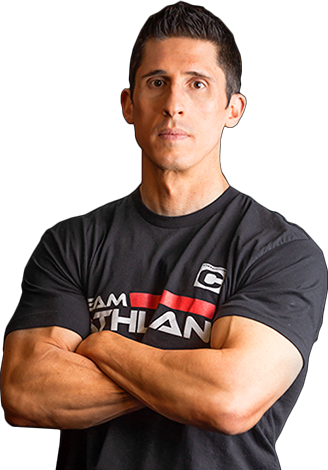
Jeff Cavaliere M.S.P.T, CSCS
Jeff Cavaliere is a Physical Therapist, Strength Coach and creator of the ATHLEAN-X Training Programs and ATHLEAN-Rx Supplements. He has a Masters in Physical Therapy (MSPT) and has worked as Head Physical Therapist for the New York Mets, as well as training many elite professional athletes in Major League Baseball, NFL, MMA and professional wrestling. His programs produce “next level” achievements in muscle size, strength and performance for professional athletes and anyone looking to build a muscular athletic physique.





